- Home
- Kahlil Gibran
Collected Poetical Works of Kahlil Gibran Page 19
Collected Poetical Works of Kahlil Gibran Read online
Page 19
We shall pass with the flowing of the rivers, and we shall be nameless.
But those who crossed Him in mid-stream shall be remembered for crossing Him in mid-stream.
MANASSEH
On the Speech and Gesture of Jesus
Yes, I used to hear Him speak. There was always a ready word upon His lips.
But I admired Him as a man rather than as a leader. He preached something beyond my liking, perhaps beyond my reason. And I would have no man preach to me.
I was taken by His voice and His gestures, not by the substance of His speech. He charmed me but never convinced me; for He was too vague, too distant and obscure to reach my mind.
I have known other men like Him. They are never constant nor are they consistent. It is with eloquence not with principles that they hold your ear and your passing thought, but never the core of your heart.
What a pity that His enemies confronted Him and forced the issue. It was not necessary. I believe their hostility will add to His stature and turn His mildness to power.
For is it not strange that in opposing a man you give Him courage? And in staying His feet you give Him wings?
I know not His enemies, yet I am certain that in their fear of a harmless man they have lent Him strength and made Him dangerous.
JEPHTHA OF CAESAREA
A Man Weary of Jesus
This man who fills your day and haunts your night is repellent to me. Yet you would tire my eyes with His sayings and my mind with His deeds.
I am weary of His words, and all that He did. His very name offends me, and the name of His countryside. I will none of Him.
Why make you a prophet of a man who was but a shadow? Why see a tower in this sand-dune, or imagine a lake in the raindrops gathered together in this hoof-print?
I scorn not the echo of caves in valleys nor the long shadows of the sunset; but I would not listen to the deceptions that hum in your head, nor study the reflections in your eyes.
What word did Jesus utter that Halliel had not spoken? What wisdom did He reveal that was not of Gamaliel? What are His lispings to the voice of Philo? What cymbals did He beat that were not beaten ere ever He lived?
I hearken to the echo from the caves into the silent valleys, and I gaze upon the long shadows of sunset; but I would not have this man’s heart echo the sound of another heart, nor would I have a shadow of the seers call himself a prophet.
What man shall speak since Isaiah has spoken? Who dares sing since David? And shall wisdom be born now, after Solomon has been gathered to his fathers?
And what of our prophets, whose tongues were swords and their lips flames?
Left they a straw behind for this gleaner of Galilee? Or a fallen fruit for the beggar from the North Country? There was naught for Him save to break the loaf already baked by our ancestors, and to pour the wine which their holy feet had already passed from the grapes of old.
It is the potter’s hand I honour not the man who buys the ware.
I honour those who sit at the loom rather than the boor who wears the cloth.
Who was this Jesus of Nazareth, and what is He? A man who dared not live His mind. Therefore He faded into oblivion and that is His end.
I beg you, charge not my ears with His words or His deeds. My heart is overfull with the prophets of old, and that is enough.
JOHN THE BELOVED DISCIPLE
On Jesus the Word
You would have me speak of Jesus, but how can I lure the passion-song of the world into a hollowed reed?
In every aspect of the day Jesus was aware of the Father. He beheld Him in the clouds and in the shadows of the clouds that pass over the earth. He saw the Father’s face reflected in the quiet pools, and the faint print of His feet upon the sand; and He often closed His eyes to gaze into the Holy Eyes.
The night spoke to Him with the voice of the Father, and in solitude He heard the angel of the Lord calling to Him. And when He stilled Himself to sleep He heard the whispering of the heavens in His dreams.
He was often happy with us, and He would call us brothers.
Behold, He who was the first Word called us brothers, though we were but syllables uttered yesterday.
You ask why I call Him the first Word.
Listen, and I will answer:
In the beginning God moved in space, and out of His measureless stirring the earth was born and the seasons thereof.
Then God moved again, and life streamed forth, and the longing of life sought the height and the depth and would have more of itself.
Then God spoke thus, and His words were man, and man was a spirit begotten by God’s Spirit.
And when God spoke thus, the Christ was His first Word and that Word was perfect; and when Jesus of Nazareth came to the world the first Word was uttered unto us and the sound was made flesh and blood.
Jesus the Anointed was the first Word of God uttered unto man, even as if an apple tree in an orchard should bud and blossom a day before the other trees. And in God’s orchard that day was an aeon.
We are all sons and daughters of the Most High, but the Anointed One was His first-born, who dwelt in the body of Jesus of Nazareth, and He walked among us and we beheld Him.
All this I say that you may understand not only in the mind but rather in the spirit. The mind weighs and measures but it is the spirit that reaches the heart of life and embraces the secret; and the seed of the spirit is deathless.
The wind may blow and then cease, and the sea shall swell and then weary, but the heart of life is a sphere quiet and serene, and the star that shines therein is fixed for evermore.
MANNUS THE POMPEIIAN TO A GREEK
On the Semitic Deity
The Jews, like their neighbours the Phoenicians and the Arabs, will not suffer their gods to rest for a moment upon the wind.
They are over-thoughtful of their deity, and over-observant of one another’s prayer and worship and sacrifice.
While we Romans build marble temples to our gods, these people would discuss their god’s nature. When we are in ecstasy we sing and dance round the altars of Jupiter and Juno, of Mars and Venus; but they in their rapture wear sackcloth and cover their heads with ashes – and even lament the day that gave them birth.
And Jesus, the man who revealed God as a being of joy, they tortured Him, and then put Him to death.
These people would not be happy with a happy god. They know only the gods of their pain.
Even Jesus’ friends and disciples who knew His mirth and heard His laughter, make an image of His sorrow, and they worship that image.
And in such worship they rise not to their deity; they only bring their deity down to themselves.
I believe however that this philosopher, Jesus, who was not unlike Socrates, will have power over His race and mayhap over other races.
For we are all creatures of sadness and of small doubts. And when a man says to us, “Let us be joyous with the gods,” we cannot but heed his voice. Strange that the pain of this man has been fashioned into a rite.
These people would discover another Adonis, a god slain in the forest, and they would celebrate his slaying. It is a pity they heed not His laughter.
But let us confess, as Roman to Greek. Do even we ourselves hear the laughter of Socrates in the streets of Athens? Is it ever in us to forget the cup of hemlock, even at the theatre of Dionysus?
Do not rather our fathers still stop at the street corners to chat of troubles and to have a happy moment remembering the doleful end of all our great men?
PONTIUS PILATUS
Of Eastern Rites and Cults
My wife spoke of Him many times ere He was brought before me, but I was not concerned.
My wife is a dreamer, and she is given, like so many Roman women of her rank, to Eastern cults and rituals. And these cults are dangerous to the Empire; and when they find a path to the hearts of our women they become destructive.
Egypt came to an end when the Hyskos of Arabia brought to her the one God of thei
r desert. And Greece was overcome and fell to dust when Ashtarte and her seven maidens came from the Syrian shores.
As for Jesus, I never saw the man before He was delivered up to me as a malefactor, as an enemy of His own nation and also of Rome.
He was brought into the Hall of Judgment with His arms bound to His body with ropes.
I was sitting upon the dais, and He walked towards me with long, firm steps; then He stood erect and His head was held high.
And I cannot fathom what came over me at that moment; but it was suddenly my desire, though not my will, to rise and go down from the dais and fall before Him.
I felt as if Caesar had entered the Hall, a man greater than even Rome herself.
But this lasted only a moment. And then I saw simply a man who was accused of treason by His own people. And I was His governor and His judge.
I questioned Him but he would not answer. He only looked at me. And in His look was pity, as if it were He who was my governor and my judge.
Then there rose from without the cries of the people. But He remained silent, and still He was looking at me with pity in His eyes.
And I went out upon the steps of the palace, and when the people saw me they ceased to cry out. And I said, “What would you with this man?”
And they shouted as if with one throat, “We would crucify Him. He is our enemy and the enemy of Rome.”
And some called out, “Did He not say He would destroy the temple? And was it not He who claimed the kingdom? We will have no king but Caesar.”
Then I left them and went back into the Judgment Hall again, and I saw Him still standing there alone, and His head was still high.
And I remembered what I had read that a Greek philosopher said, “The lonely man is the strongest man.” At that moment the Nazarene was greater than His race.
And I did not feel clement towards Him. He was beyond my clemency.
I asked Him then, “Are you the King of the Jews?”
And He said not a word.
And I asked Him again, “Have you not said that you are the King of the Jews?”
And He looked upon me.
Then He answered with a quiet voice, “You yourself proclaimed me king. Perhaps to this end I was born, and for this cause came to bear witness unto truth.”
Behold a man speaking of truth at such a moment.
In my impatience I said aloud, to myself as much as to Him, “What is truth? And what is truth to the guiltless when the hand of the executioner is already upon him?”
Then Jesus said with power, “None shall rule the world save with the Spirit and truth.”
And I asked Him saying, “Are you of the Spirit?”
He answered, “So are you also, though you know it not.”
And what was the Spirit and what was truth, when I, for the sake of the State, and they from jealousy for their ancient rites, delivered an innocent man unto His death?
No man, no race, no empire would halt before a truth on its way towards self-fulfilment.
And I said again, “Are you the King of the Jews?”
And He answered, “You yourself say this. I have conquered the world ere this hour.”
And this alone of all that He said was unseemly, inasmuch as only Rome has conquered the world.
But now the voices of the people rose again, and the noise was greater than before.
And I descended from my seat and said to Him, “Follow me.”
And again I appeared upon the steps of the palace, and He stood there beside me.
When the people saw Him they roared like the roaring thunder. And in their clamour I heard naught save “Crucify Him, crucify Him.”
Then I yielded Him to the priests who had yielded Him to me and I said to them, “Do what you will with this just man. And if it is your desire, take with you soldiers of Rome to guard Him.”
Then they took Him, and I decreed that there be written upon the cross above His head, “Jesus of Nazareth, King of the Jews.” I should have said instead, “Jesus of Nazareth, a King.”
And the man was stripped and flogged and crucified.
It would have been within my power to save Him, but saving Him would have caused a revolution; and it is always wise for the governor of a Roman province not to be intolerant of the religious scruples of a conquered race.
I believe unto this hour that the man was more than an agitator. What I decreed was not my will, but rather for the sake of Rome.
Not long after, we left Syria, and from that day my wife has been a woman of sorrow. Sometimes even here in this garden I see a tragedy in her face.
I am told she talks much of Jesus to other women of Rome.
Behold, the man whose death I decreed returns from the world of shadows and enters into my own house.
And within myself I ask again and again, What is truth and what is not truth?
Can it be that the Syrian is conquering us in the quiet hours of the night?
It should not indeed be so.
For Rome must needs prevail against the nightmares of our wives.
BARTHOLOMEW IN EPHESUS
On Slaves and Outcasts
The enemies of Jesus say that He addressed His appeal to slaves and outcasts, and would have incited them against their lords. They say that because He was of the lowly He invoked His own kind, yet that He sought to conceal His own origin.
But let us consider the followers of Jesus, and His leadership.
In the beginning He chose for companions few men from the North Country, and they were freemen. They were strong of body and bold of spirit, and in these past two-score years they have had the courage to face death with willingness and defiance.
Think you that these men were slaves or outcasts?
And think you that the proud princes of Lebanon and Armenia have forgotten their station in accepting Jesus as a prophet of God?
Or think you the high-born men and women of Antioch and Byzantium and Athens and Rome could be held by the voice of a leader of slaves?
Nay, the Nazarene was not with the servant against his master; neither was He with the master against his servant. He was with no man against another man.
He was a man above men, and the streams that ran in His sinews sang together with passion and with might.
If nobility lies in being protective, He was the noblest of all men. If freedom is in thought and word and action, He was the freest of all men. If high birth is in pride that yields only to love and in aloofness that is ever gentle and gracious, then He was of all men the highest born.
Forget not that only the strong and the swift shall win the race and the laurels, and that Jesus was crowned by those who loved Him, and also by His enemies though they knew it not.
Even now He is crowned every day by the priestesses of Artemis in the secret places of her temple.
MATTHEW
On Jesus by a Prison Wall
Upon an evening Jesus passed by a prison that was in the Tower of David. And we were walking after Him.
Of a sudden He tarried and laid His cheek against the stones of the prison wall. And thus He spoke:
“Brothers of my ancient day, my heart beats with your hearts behind the bars. Would that you could be free in my freedom and walk with me and my comrades.
“You are confined, but not alone. Many are the prisoners who walk the open streets. Their wings are not shorn, but like the peacock they flutter yet cannot fly.
“Brothers of my second day, I shall soon visit you in your cells and yield my shoulder to your burden. For the innocent and the guilty are not parted, and like the two bones of the forearm they shall never be cleaved.
“Brothers of this day, which is my day, you swam against the current of their reasoning and you were caught. They say I too shall swim against that current. Perhaps I shall soon be with you, a law-breaker among the law-breakers.
“Brothers of a day not yet come, these walls shall fall down, and out of the stones other shapes shall be fashioned by Him whose ma
llet is light, and whose chisel is the wind, and you shall stand free in the freedom of my new day.”
Thus spoke Jesus and He walked on, and His hand was upon the prison wall until He passed by the Tower of David.
ANDREW
On Prostitutes
The bitterness of death is less bitter than life without Him. The days were hushed and made still when he was silenced. Only the echo in my memory repeats His words. But not His voice.
Once I heard Him say: “Go forth in your longing to the fields, and sit by the lilies, and you shall hear them humming in the sun. They weave not cloth for raiment, nor do they raise wood or stone for shelter; yet they sing.
“He who works in the night fulfils their needs and the dew of His grace is upon their petals.
“And are not you also His care who never wearies nor rests?”
And once I heard Him say, “The birds of the sky are counted and enrolled by Your Father even as the hairs of your head are numbered. Not a bird shall lie at the archer’s feet, neither shall a hair of your head turn grey or fall into the emptiness of age without His will.”
And once again He said, “I have heard you murmur in your hearts: ‘Our God shall be more merciful unto us, children of Abraham, than unto those who knew Him not in the beginning.’
“But I say unto you that the owner of the vineyard who calls a labourer in the morning to reap, and calls another at sundown, and yet renders wages to the last even as to the first, that man is indeed justified. Does he not pay out of his own purse and with his own will?
“So shall my Father open the gate of His mansion at the knocking of the Gentiles even as at your knocking. For His ear heeds the new melody with the same love that it feels for the oft-heard song. And with a special welcome because it is the youngest string of His heart.”
And once again I heard Him say, “Remember this: a thief is a man in need, a liar is a man in fear; the hunter who is hunted by the watchman of your night is also hunted by the watchman of his own darkness.

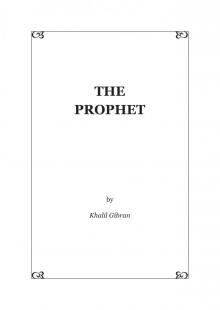 The Prophet
The Prophet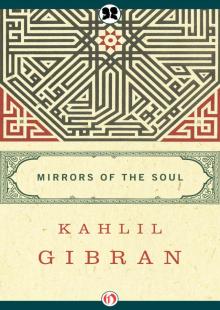 Mirrors of the Soul
Mirrors of the Soul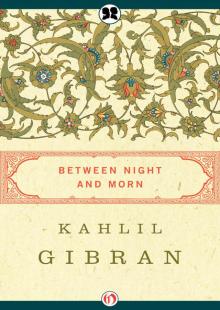 Between Night and Morn
Between Night and Morn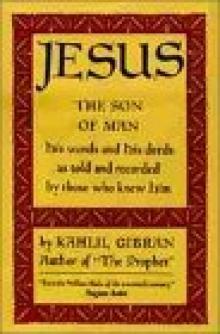 Jesus the Son of Man
Jesus the Son of Man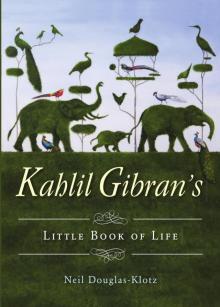 The Little Book of Life's Wisdom
The Little Book of Life's Wisdom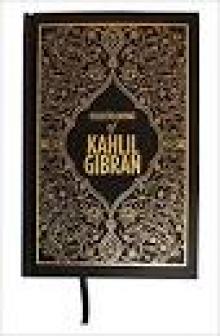 The Kahlil Gibran Collection
The Kahlil Gibran Collection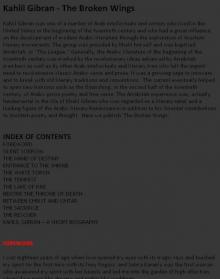 The Broken Wings
The Broken Wings Collected Poetical Works of Kahlil Gibran
Collected Poetical Works of Kahlil Gibran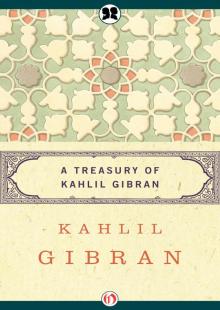 The Treasured Writings of Kahlil Gibran
The Treasured Writings of Kahlil Gibran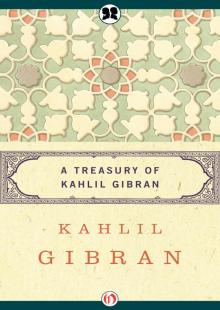 Treasury of Kahlil Gibran
Treasury of Kahlil Gibran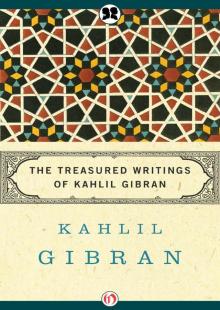 Treasured Writings of Kahlil Gibran
Treasured Writings of Kahlil Gibran